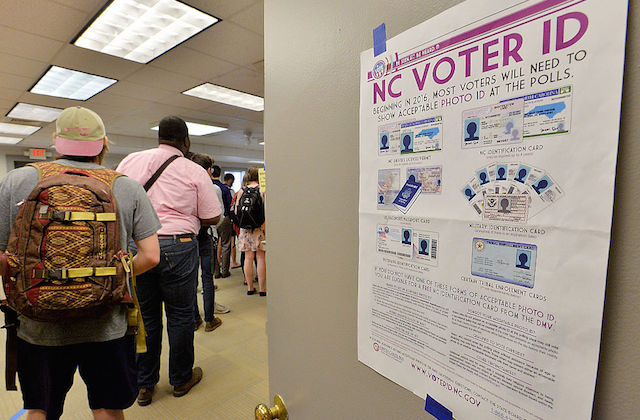Supreme Court Says No to North Carolina's Racist Voting Law

This fall’s general election will be a lot more inclusive for Black voters in North Carolina. Yesterday (August 31), the Supreme Court denied the state’s request to stay an appeals court ruling that found that its voter identification laws are discriminatory.
In August, the United States Court of Appeals for the Fourth Circuit unanimously ruled that not only was the law discriminatory, but that the state’s Republican leadership specifically sought to curtail the rights of African Americans. North Carolina Governor Pat McCrory (R) filed an emergency stay request in an attempt to keep the voter ID laws in place through the November 8 election.
The Supreme Court split among ideological lines in its decision, with conservatives Chief Justice John Roberts Jr. and Samuel A. Alito Jr., Justices Anthony Kennedy agreeing with the stay, minus the preregistration provision. Justice Clarence Thomas wanted to stay the decision in its entirety. Justices Stephen Breyer, Ruth Bader Ginsburg, Elena Kagen and Sonia Sotomayor voted in favor of immediately scrapping the law. Without a tie-breaker, the lower court’s decision stands.
McCrory was not happy, and he said as much via a statement posted to his website:
North Carolina has been denied basic voting rights already granted to more than 30 other states to protect the integrity of one person, one vote through a common-sense voter ID law. Even without any support from our state's attorney general, we were pleased that four justices, including Chief Justice John Roberts, agreed with this right while four liberal justices blocked North Carolina protections afforded by our sensible voter laws.
Meanwhile, the North Carolina Conference of the NAACP, which co-led the original lawsuit, counted the Supreme Court’s decision as a win.
“Today we achieved another major victory for justice, African Americans, Latinos and all North Carolinians,” said Rev. William J. Barber II, president of the North Carolina NAACP, per The Washington Post. “The critical rejection of the state’s position will allow the people of North Carolina to exercise the fundamental right to vote this November without expansive restrictions by racist politicians or racist policies.”
The American Civil Liberties Union (ACLU), also challenged the law, which blocked early voting, preregistration, same-day registration and out-of-precinct provisional voting. “The Supreme Court was correct to deny North Carolina’s last-ditch effort to undermine African-American voter participation in the November election,” Dale Ho, director of the ACLU’s Voting Rights Project, said in a statement. “This ruling means that thousands of voters who would have been disenfranchised will now be able to participate in the presidential election.”
